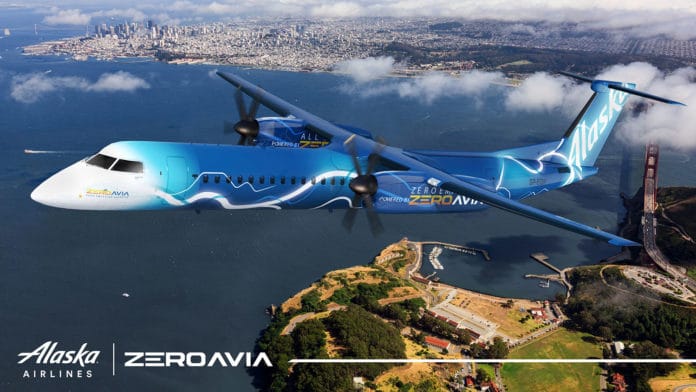ZeroAvia has announced the development collaboration with Alaska Air Group, the parent company of Alaska Airlines, for a hydrogen-electric powertrain capable of flying 76-seat regional aircraft in excess of 500 NM. Once completed, the ZA2000, the largest ZeroAvia’s powertrain platform, should boast between 2,000 and 5,000 kilowatts of power with a 500-mile range.
This technological step will allow Alaska Air to electrify most of the aircrafts and meet its goal of achieving net-zero emissions by 2040.
ZeroAvia’s powertrain is a combination of the best-in-class components from several partners, including the proprietary integration hardware and software that runs the system and interfaces with the aircraft systems. The fuel cell uses hydrogen to create a chemical reaction that produces electricity. Unlike burning hydrogen, which generates energy at high heat, the fuel cell converts hydrogen into electricity at a low temperature. The electricity from the fuel cell powers the motors, which propel the aircraft wherever it needs to go.
The two companies will initially deploy ZeroAvia’s hydrogen-electric propulsion technology into a full-size De Havilland Q400 aircraft capable of transporting 76 passengers. During this project, ZeroAvia will also work closely with aircraft regulators to ensure the aircraft meets both safety and operational requirements. ZeroAvia will set up a location in the Seattle area to support this initiative.
If proven as a viable concept, Alaska already has secured options for up to 50 kits to begin converting its regional aircraft to hydrogen-electric power through ZeroAvia’s zero-emission powertrain, starting with the Q400 aircraft. This pioneering zero-emission aviation rollout will be supported by the ground fuel production and dispensing infrastructure from ZeroAvia and its infrastructure partners.
It is expected that next year, there will be a working prototype of the first Q400 with the hydrogen fuel cell and ZA2000 powertrain, which will take off from Cotswold airport (United Kingdom).
Recently, ZeroAvia also successfully ground-tested its 600kW powertrain capable of flying airframes 10-20 seats in size 500 miles, is well advanced in preparing a 19-seat aircraft for flight testing at Cotswold Airport in the UK, and is moving to full-size prototype manufacturing of its 2,000 kW engine for demonstrations in 2022.
